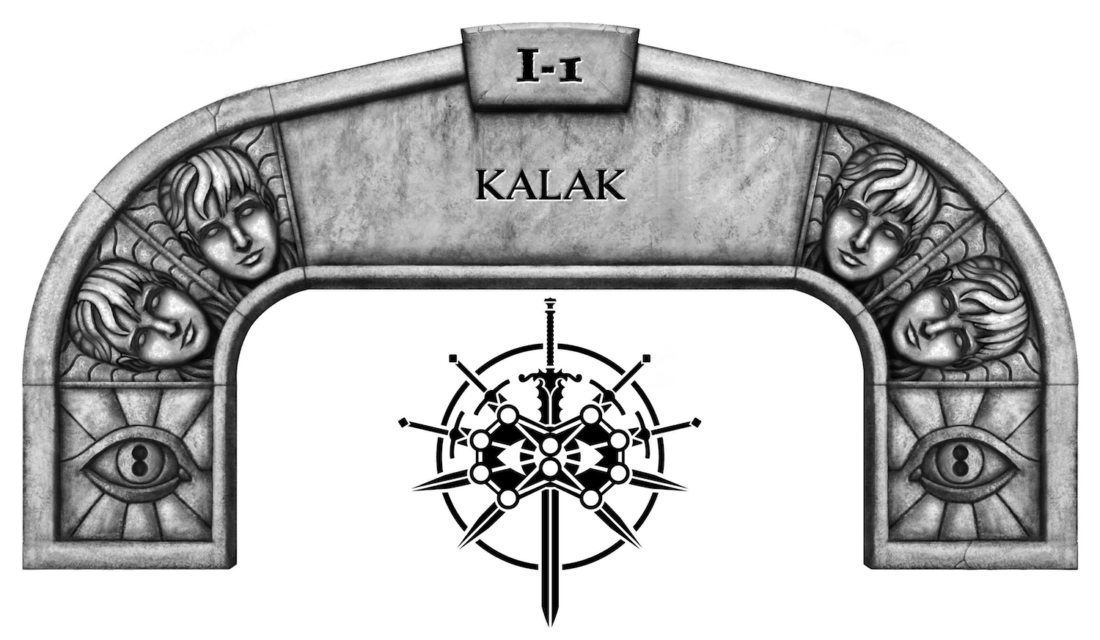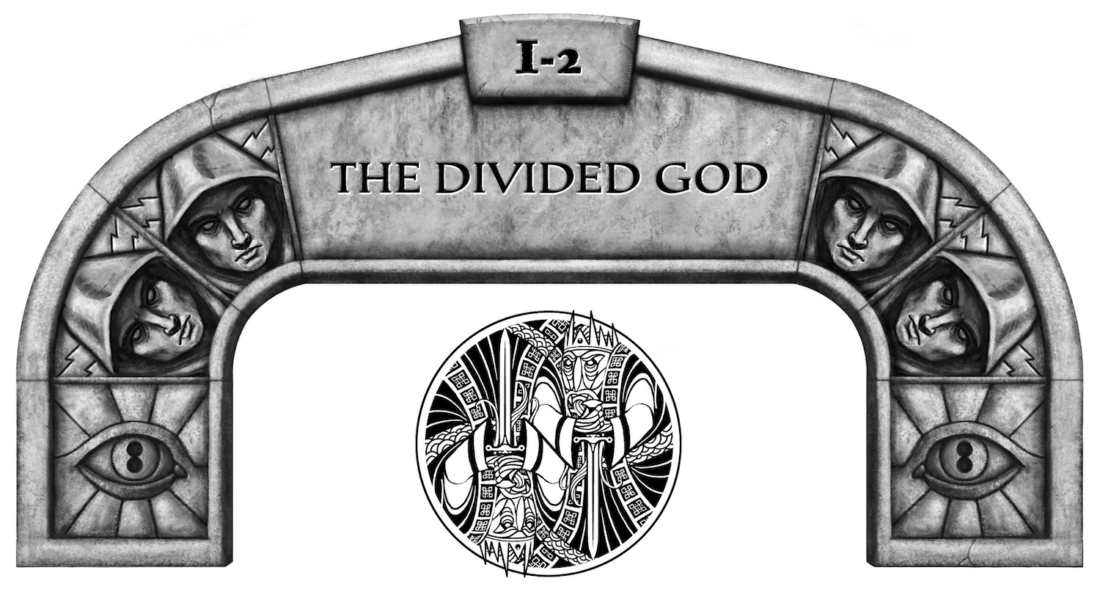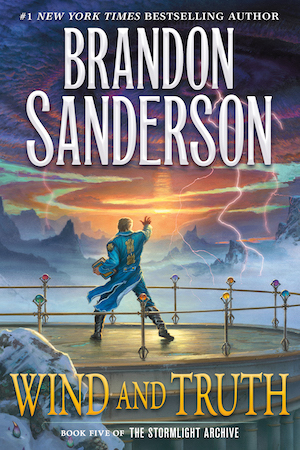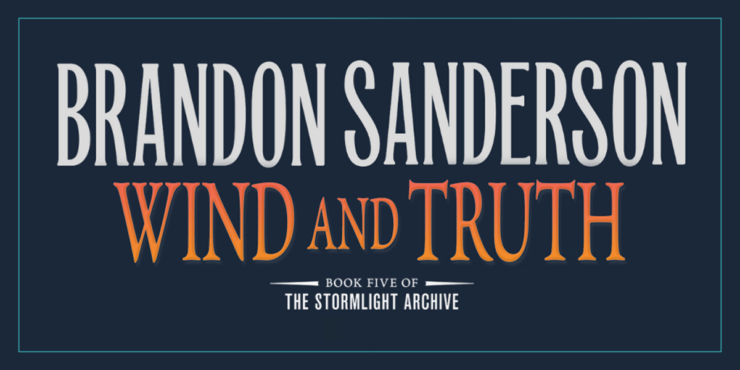Brandon Sanderson’s epic Stormlight Archive fantasy series will continue with Wind and Truth, the concluding volume of the first major arc of this ten-book series. A defining pillar of Sanderson’s “Cosmere” fantasy book universe, this newest installment of The Stormlight Archive promises huge developments for the world of Roshar, the struggles of the Knights Radiant (and friends!), and for the Cosmere at large.
Reactor is serializing the new book from now until its release date on December 6, 2024. A new installment will go live every Monday at 11 AM ET, along with read-along commentary from Stormlight beta readers and Cosmere experts Lyndsey Luther, Drew McCaffrey, and Paige Vest. You can find every chapter and commentary post published so far in the Wind and Truth index.
We’re thrilled to also include chapters from the audiobook edition of Wind and Truth, read by Michael Kramer and Kate Reading. Click here to jump straight to the audio excerpt!
Note: Title art is not final and will be updated as soon as the final cover is revealed.

Interlude 1: Kalak
Kalak locked himself into his secure building in Lasting Integrity. He checked the locks three times, then sighed, closing his eyes. The Radiants were gone.
He’d survived so, so many things, but this escape felt narrower than the others. He couldn’t help thinking that the payment for his frighteningly long life was coming due.
Even after all this time, he didn’t want to die.
He put his back to the door, breathing hard. Should he have gone with them? Eyes closed, he tried to remember the man he’d once been, the hero who had fought for thousands of years. His life seemed a blur, a wash of grey and brown, a fresh painting left out in the storm. These days he felt only panic, indecision, and a crushing darkness. Always nearby, always threatening him. Without Ishar holding some of it back… it would have destroyed him long ago.
But he’d survived. He’d survived.
What if the Ghostbloods sent others? Thaidakar wanted him. Thaidakar, a Herald from another world, a creature who was resourceful and brutal.
I need to hide somewhere else, Kalak thought. Yes. I will gather my things and… and I will go. He rushed into his study, opening the door and stepping through.
Immediately, the drapes from the window beside the door seized him, wrapping around him like two grasping hands, pulling him tight. They’d been cut into strange shapes. What was this? Some art of Stonewards? He panicked, but the cloth—moving on its own—filled his mouth. Like a constrictor from the old world, it bound him, tied around him, then slammed him against the wall and held him there.
He whimpered.
“Well hello, Herald,” said a man sitting at Kalak’s desk. “If you don’t mind, I have a few questions.”
He was a foreigner, with long mustaches and a short stature. Pale skin, his hands laced before him. A floppy hat rested atop the desk. Kalak thought he recognized the man. A member of the caravan? One of Prince Adolin’s soldiers?
Oh… oh no…
A dagger with a gemstone affixed to the crossguard lay next to the hat. The foreigner glanced at it, then smiled. “Oh, don’t focus on that. We won’t be needing it, will we?”
Kalak whimpered again.
The stranger picked up the box that Shallan had relinquished to Kalak, the one that held the seon. The creature liked to hide inside, timid and—
The stranger rapped on the box, and the ball of light popped out. “We good, Felt?” it asked with a feminine voice.
“Should be,” Felt replied.
“Finally!” the spren said. “You have no idea how aggravating that experience was.”
“You did well,” Felt said, leaning back in Kalak’s chair. “I heard Shallan and Adolin talking, worried about the trauma you’d undergone by being ‘in prison.’ ”
“Domi!” the spren replied. “If I had to listen to one more lovers’ spat between those two—let alone one more makeup session—I would grow a stomach so I could vomit.”
The ball of light swooped over to where Kalak was held against the wall. The spren’s entire air had changed from a frightened and abused creature—with dim light, and a symbol flickering at the center—to a glowing, confident sphere.
Storms… this was the thing they’d used to communicate. It knew everything they’d discussed. The real spy hadn’t been Shallan. He felt such a fool. He, more than any, should have realized the potential for spren to turn against you. He struggled weakly in the strange bonds.
“I was about to interrogate him, Ala,” Felt said.
“There might not be a need,” Ala replied. “I’ve already relayed the information on Mishram’s location to Iyatil.”
“And Lord Kelsier?” Felt said. “I don’t work for that masked witch.”
“Him as well,” Ala said. “Obviously.” The spren hovered around Kalak’s head. “Do we use the dagger?”
Felt considered it, saw Kalak’s distress, and frowned. “No. I don’t trust it—Iyatil gave it to us, and Lord Kelsier said to be careful. I think we wait to make sure the mission goes as planned. Mraize and Iyatil might contact us for more explanations. So we sit tight, keep this one company, and bide our time.”
“I’m ready to be done with this world.”
“It’s not so bad,” Felt said, idly playing with the dagger that could—if used correctly—end Kalak forever. “Once you get used to everyone being a foot taller than you are. Be patient, Ala. Only a fool assumes they know everything, and Kalak might yet have a part to play.”
Kalak squeezed his eyes shut, trembling, his heart beating rapidly. But a part of him… a part of him was relieved. It seemed that one way or another, further decisions were out of his hands.

Interlude 2: The Divided God
Odium knelt, holding a dying child.
This was Tu Bayla, considered a backwater by other nations—a place where foreign armies clashed, rather than ruining their own lands. Azir had fought Jah Keved—or Alethkar, when it held Jah Keved—here dozens of times over.
Few thought of Tu Bayla; when mortal, Odium never had. Yet it had its own wonderful traditions. The people raised a strain of domesticated mink as hunting companions, and nearly everyone had one as a pet. They named their daughters after stars and their sons after flowers. They loved to sing, and had the greatest variety of instruments on all of Roshar, though few outsiders ever got to hear the beautiful music.
Now they died. A famine had struck the land, initiated by the passing Everstorm destroying crops—exacerbated by the ending of trade between Azir and Jah Keved, who were now on opposite sides of the war. Most importantly, in the chaos, the government had collapsed and warlords claimed any supplies for themselves, using them as leverage to rule.
So many children died here, unseen. And Odium…
That was not my name, he thought. I cannot lose myself in godhood.
Odium wept for them, and—having formed a body from his infinite essence—held one little boy close. Cultivation appeared behind him, wearing clothing that evoked the woods—green and vibrant brown, dark hair in tight curls.
“I have infinite capacity,” Odium whispered, his voice ragged. “I can see to the ends of the cosmere. I can see the lives of people great and small. I had thought this wonderful, with so much to experience, but now I find only suffering. Infinite capacity to see. Infinite capacity to feel. Infinite capacity for agony.”
“Yes,” Cultivation said softly.
Odium was a person divided. One side thinking, the other feeling. The former understood that with his vast powers and knowledge, he would of course have to accept certain drawbacks or complications.
The latter just wanted to weep.
“This is a curse,” he said, holding the dying child close. “I should be able to help them. Save them!”
“You are forbidden,” Cultivation said, “from taking direct action against any who are not fully given to you.”
“Because of the pact my predecessor made,” he spat. “I can break it.”
“In so doing, you would be vulnerable to outside attack,” she said. “The powers bind us to our promises, particularly those made and sealed with a formal oath.” She crouched by him.
“You promised to teach me what it is to be a god,” he whispered.
“I am,” she said. “I know the pain, Odium, and why it must be. Tell me you don’t. Tell me you can’t understand.”
The logical side of him asserted control, shoving down the side that simply wanted to rage. “I understand,” he admitted. “Assuming these were fully mine, and I were allowed, it would not be enough. I could wave my hand, heal this boy’s body—but I’d return in several weeks and find him starving again, because the systems that caused this suffering are still in place.”
“Yes.”
“So I change the systems,” he said. “I strike down the warlords who hoard resources! I force them to share, to not hurt one another. I make pain impossible.”
“And in so doing…”
“I create a country where there are no consequences. Is that so bad?”
“You tell me,” she said in her infuriatingly calm way.
Yes, it would be bad. He could see all the permutations of time, as well as attempts by other Shards like himself to do this very thing. By directly intervening on such a granular level, he risked creating a society where no one learned, and where civilization did not progress. By supernaturally forbidding warlords, he would also stifle scientists and artists. By removing the capacity for violence, he would also remove the capacity for mercy.
The child died. He saw the soul briefly before it vanished to a place beyond his touch.
“What do we do instead?” Cultivation said.
“You want me to say,” he whispered, “that we create systems—teachings, incentives—that encourage the right decisions. That we prevent war by building up societies where people choose peace. We prevent greed by nurturing governments where the greedy are held accountable. We take time, and we steer, but we do not dominate.”
“Yes.”
He carefully rested the child’s body on the ground, then stood to face Cultivation, who rose to meet him eye to eye. Anger made him tremble. This divinity he held, it had so much emotion he could barely steer it.
“I blame you,” he hissed.
“For the boy’s death?” Cultivation said. “But I just showed you that—”
“I blame you,” he said, “because you should have done better. Eight thousand years, and you should have fixed this. All three of you.”
“You can see the circumstances that prevented that.”
“Your fault still. I can do better.”
“Odium… do not make this mistake.”
“The problem,” he said, “is not these people. You shift the blame to them with elementary theological arguments.”
“Elementary,” she replied, “in the same way that gravity is elementary. Basic, because it is the foundation. People must be allowed choice.”
“There is a spectrum of choice that can be allowed,” he said. “No society can persist with complete freedom, and growth can happen within limits. I can make it so that free will exists to an acceptable degree, while also preventing famines.”
“You could do it now,” she said. “Calm the Everstorm. Make peace between nations. Restore trade.”
“And in so doing, set them up for another war in a few years? Learn your own lessons, Cultivation. These people will not get along because they have different forces manipulating them. Honor’s touch lingers, and your own meddling—invisible to most—creates so much tension and strife. It is worse in the greater cosmere. So many gods who are cowards.”
“Because we give people choice?”
“Because you killed your father, and now worry the same will happen to you. Like the warlords here, you consolidate power so that no one can kill you.” He stepped toward her, raising a fist, the emotions making a tempest of rage inside him. “I am the very substance of passion, and where a person suffers anywhere in this miserable galaxy, I feel it. That is the burden of this power.”
“It is why,” she said, “I called yours the most dangerous and difficult of them all. You can be the one who—”
“I know their anger, Cultivation. Do not lecture me. Oh, I taste it. Every moment. And I also know there will not be a way to soothe that agony, not until…”
She held his eyes. He saw in them the depths of eternity, as he was sure she saw in his—for these forms they wore were but cloaks across a vast essence that was itself infinite.
“Not until what?” she demanded.
“Not until there is but one god,” Odium whispered.
“Do not go down this path. It destroyed your predecessor.”
“I destroyed my predecessor,” he said. “Leave me. I am finished with your ‘lessons.’ ”
She did, stalking away and vanishing—leaving him with the knowledge that she would work against him. She had already been planning to do so, pulling on threads for millennia to get what she wanted. She had raised him up because the old Odium was becoming too violent, too willing to destroy everything as the emotions raged freely. This had been her only choice to prevent a much greater cataclysm.
The divided one knelt, and let himself feel. He was not Odium. He held Odium. He would not let it rule.
He was not Odium.
He was Taravangian.
And he had an important mission, the same that he’d given himself years ago when he’d seen the threat to Kharbranth—then had moved to save it. He was the one who could both see the coming danger and be willing to stop it.
He was Taravangian, the divided one—and he could save them. All of them.
Excerpted from Wind and Truth, copyright © 2024 Dragonsteel Entertainment.
Join the Read-Along Discussion Here
Read the Next Chapter Here
Buy the Book


Wind and Truth










